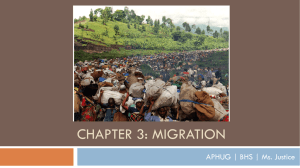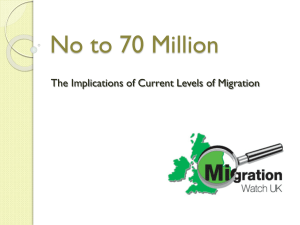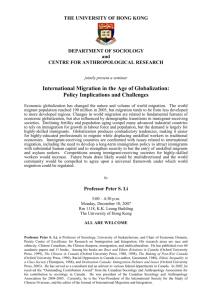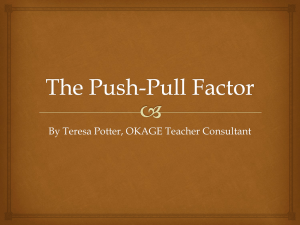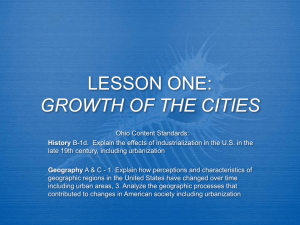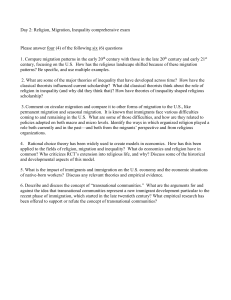Politics of International Migration and Refugees
advertisement
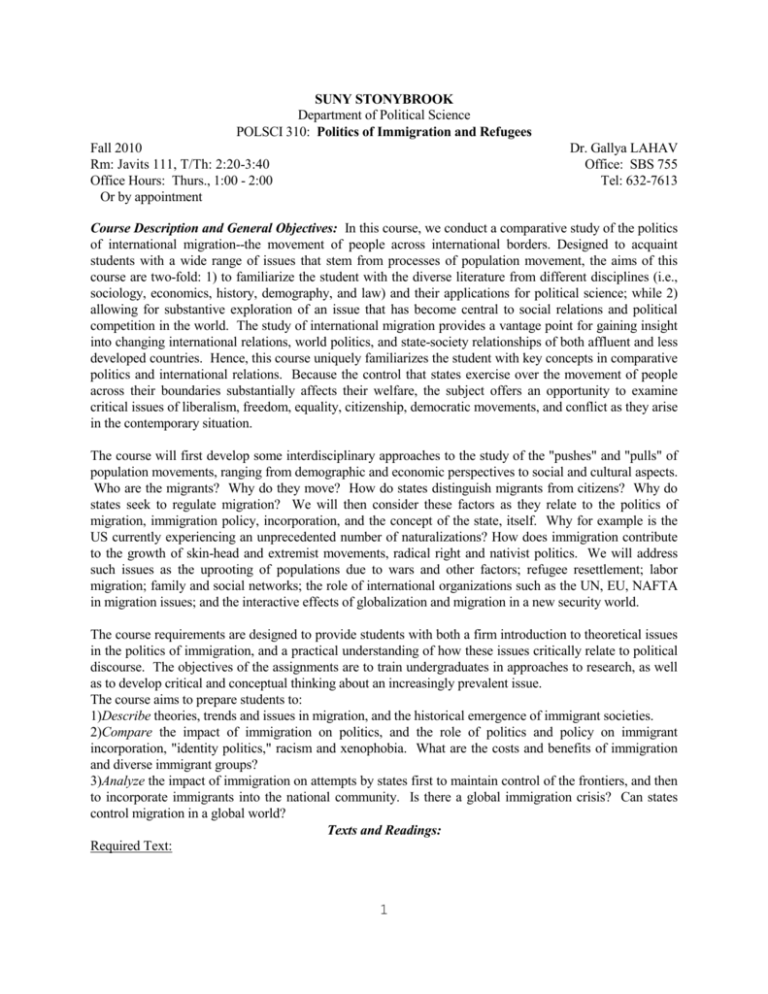
SUNY STONYBROOK Department of Political Science POLSCI 310: Politics of Immigration and Refugees Fall 2010 Rm: Javits 111, T/Th: 2:20-3:40 Office Hours: Thurs., 1:00 - 2:00 Or by appointment Dr. Gallya LAHAV Office: SBS 755 Tel: 632-7613 Course Description and General Objectives: In this course, we conduct a comparative study of the politics of international migration--the movement of people across international borders. Designed to acquaint students with a wide range of issues that stem from processes of population movement, the aims of this course are two-fold: 1) to familiarize the student with the diverse literature from different disciplines (i.e., sociology, economics, history, demography, and law) and their applications for political science; while 2) allowing for substantive exploration of an issue that has become central to social relations and political competition in the world. The study of international migration provides a vantage point for gaining insight into changing international relations, world politics, and state-society relationships of both affluent and less developed countries. Hence, this course uniquely familiarizes the student with key concepts in comparative politics and international relations. Because the control that states exercise over the movement of people across their boundaries substantially affects their welfare, the subject offers an opportunity to examine critical issues of liberalism, freedom, equality, citizenship, democratic movements, and conflict as they arise in the contemporary situation. The course will first develop some interdisciplinary approaches to the study of the "pushes" and "pulls" of population movements, ranging from demographic and economic perspectives to social and cultural aspects. Who are the migrants? Why do they move? How do states distinguish migrants from citizens? Why do states seek to regulate migration? We will then consider these factors as they relate to the politics of migration, immigration policy, incorporation, and the concept of the state, itself. Why for example is the US currently experiencing an unprecedented number of naturalizations? How does immigration contribute to the growth of skin-head and extremist movements, radical right and nativist politics. We will address such issues as the uprooting of populations due to wars and other factors; refugee resettlement; labor migration; family and social networks; the role of international organizations such as the UN, EU, NAFTA in migration issues; and the interactive effects of globalization and migration in a new security world. The course requirements are designed to provide students with both a firm introduction to theoretical issues in the politics of immigration, and a practical understanding of how these issues critically relate to political discourse. The objectives of the assignments are to train undergraduates in approaches to research, as well as to develop critical and conceptual thinking about an increasingly prevalent issue. The course aims to prepare students to: 1)Describe theories, trends and issues in migration, and the historical emergence of immigrant societies. 2)Compare the impact of immigration on politics, and the role of politics and policy on immigrant incorporation, "identity politics," racism and xenophobia. What are the costs and benefits of immigration and diverse immigrant groups? 3)Analyze the impact of immigration on attempts by states first to maintain control of the frontiers, and then to incorporate immigrants into the national community. Is there a global immigration crisis? Can states control migration in a global world? Texts and Readings: Required Text: 1 *Messina and Lahav, The Migration Reader: A Key Text (Lynne Rienner, Pub., Boulder, Colorado, 2006) *Stephen Castles and Mark J. Miller, The Age of Migration: International Population Movements in the Modern World, 4th ed. (New York: Guilford, 2009). Optional Texts: Gallya Lahav, Immigration and Politics in the New Europe: Reinventing Borders (Cambridge: Cambridge University Press, 2004) Required Readings: The course puts a heavy emphasis on prescribed weekly readings, which have been specifically compiled in my new co-edited Reader (Messina and Lahav, 2006), as well as the textbook (Castles and Miller). Both (as well as optional readings) are available for sale at the University Bookstore and in the Stonybook Store (25A). Students are expected to cover all assigned readings in advance of class and be prepared to discuss them. Some readings may be assigned as excerpts, and others may be revised by the instructor. Readings subject to change: STAY TUNED.... Course Requirements: Final grades will be based on 5 components: I). Attendance, Participation, and Blackboard: (25%) Each class meeting will assume that the reading assignments have been met. Lectures will not necessarily review the readings, but may incorporate them. Thus, any absence may not be replaced by the reading assignments. Examinations and assignments will cover both readings and lectures, and thus attendance is mandatory. Remember participation is more than attendance. It is being prepared for discussion. Some class meetings will be rescheduled to allow time for guest lecture and/or film. You will be notified in advance, and therefore should STAY TUNED. Blackboard Discussions To facilitate student interaction and to ensure lively class discussion, an electronic blackboard has been created for our class at the following URL: http://blackboard.stonybrook.edu Should you have any problem logging into Blackboard, please go to the Main Library Sinc Site room S1460 or contact site via email: http://www.sinc.sunysb.edu// for help. All students are required to cover the readings in advance of class, and to participate in weekly memos to the class (one-page absolute maximum) emailed to the class by the first day of the week (Monday). Memos should synthesize, integrate, and critique the weekly readings and/or the films previously covered. It should also consider and apply current events issues, electoral debates, media and film discourse where relevant. The purpose of this on-going assignment is to develop your academic reasoning and application, as well as writing skills. It also strives to maintain the dialogue throughout the semester. Students should provide overview of the theme chapters and the link between them as well as to the session’s theme of the week. Each student will be required to serve as a (co)discussant for one class. Serving as a discussant entails both: a)emailing to the class a 2-page response to the comments they made in their memos, by 10 AM (without exception) by the next week’s class meeting (Thursday); and b)being co-responsible for leading and moderating class discussion during the topic week. 2 Class moderators should review the arguments, evaluate the methods and evidence, and provide critique recommending (or not) the articles. The short blackboard memo should summarize and critique the readings by addressing some or all of the following questions: a) What is/are the central question(s) addressed by the author? b) What, if any, hypothesis is explored in this research? c) What is/are the main argument(s) developed by the author? d) What, if any, are the dependent and independent variables introduced? e) On the basis of what kinds of research and evidence has the author developed his/her study? What do you see as the strengths and shortcomings of this piece of research? f) What practical and/or policy relevance does the article have for current debates on immigration? II). Midterm Exam: October 21, 2010 (25%) Part of the class session prior to exam will be set aside for a review. Exam will cover Intro and Part I of required readings and lectures. The format for the midterm will be identifications, short-answers and essays. III.) Debates (5 % or the direction of rounding grades!): Restrictive versus Liberal Immigration Policy: Should Immigration to the US be Restricted? Students will be randomly assigned a position on the politically contested issue above, according to 3 groups: pros, cons, and judges. Short position handouts will be distributed to each student prior to class debates (on November 2), and students will be expected to meet with their group to outline a strategy, prepare their arguments and counterarguments, and ensure that all members participate on an equal basis. Students can also choose if easier to communicate through Class BlackBoard Discussions. Each member is expected to participate in an active discussion of their position based on their assigned reading (but may be supplemented by additional reading). At the start of the debate, I will provide a brief overview of the issue at hand. Each group's leader will begin with a 5 minute overview of their group's position, and then open up the debate to individual members. Each group leader will then summarize the main points of their position. The student debates will include the pro and con positions of the argument, the evidence, and the implications of the argument. Following the debate, part of our following discussion will be devoted to the ruling. The judges will each give a 5 minute evaluation of the strength of each side's arguments, and a decision. The debate will conclude with a summary and any personal renunciation of actual positions that students may wish to volunteer. Note: If time is available, mini-debates will follow. IV). Current Events Journal: Due November 23 (10%) Students should keep abreast of the practical relevance of our theoretical concerns, and be able to critically relate the two. Hence, throughout the semester, students are expected to keep a journal consisting of 3 or more newspaper or magazine clippings which relate to our subject matter. You can start to collect newspaper and magazine articles now. Each article (or a copy of it) should be clipped and accompanied by an entry consisting of date, source, and a succinct presentation of the issue in light of the course. You may provide additional information if it is helpful, and raise some questions for discussion. We will spend part of several classes discussing issues raised in this course that are currently in the news. VI). Group Research Project and Final Paper Due December 7 (=35% @ 25% individual component + 10% group grade) September 21: Individual agency proposal 3 October 12-14: Group proposal on agency choice is due including initial research design (includes hypothesis, variables, questionaires for survey/interviews) and broad overview of regulatory framework December 7: Final paper due (5-6 double-spaced pages or 10 pages if co-authored). Since the aim of this upper-division course is to introduce students to empirical research at the ground level, throughout the semester, we will conduct original research and create a research design that will include questionaires and interview data. The basis of this will be derived from our theoretical frameworks, and will include targeting various agencies for fieldwork on remote control immigration policy. Each student will select an agency that deals with immigrants or immigration questions in some form. Based on the agency, you will be divided into 4 groups: national, international, local/state, or private. You will be asked to consider the relations between these agencies to each other, and to immigration-related questions, as well as their implications for state control of migration. For the group component of the grade, it is imperative that each group work out a division of labor and ensure that all members of the group perform. It will adversely affect the grades of all students in the group if the project is incomplete or if individual group members do not participate. Each student will be expected to sign up for an agency early in the semester (no later than 16 September). This should state the agency chosen, reasons for choice, how easy/difficult you expect contact to be, what kind of support in contact you have (or if you have already made contact), what your expectations are, what kinds of question(s) you are interested in, and most of all, what will you be looking to find. Each group is expected to hand in a 2-3 page research design, which includes all agencies in their section (e.g., international, private, local, public/central state) questions for survey questionnaire, and interview, and overview of their regulatory approach to migration. This will be presented to the class over the week of October 12-14. Each group will present their data findings as a whole. Each group will be expected to choose a leader to give an overall assessment, followed by brief comments by individual group members. There will be 5 minutes for question time after each group presentation. Each student will be asked to prepare a 5-6 (not to be exceeded), double-spaced research paper, which includes conceptual frameworks, models, methods, analyses, findings and implications of their agency’s approach to migration regulation. It should also include analysis on how your research relates to other members of the group, and larger class project. The paper should clearly demonstrate a familiarity with the literature relevant to the topic; incorporate at least four outside scholarly sources (than those assigned for class); and discuss data issues (i.e., difficulty finding material or shortage of literature, etc.). If there are group members interested in teaming up for final research paper, this is an acceptable option, which needs to be approved by instructor no later than November 11. In this case, the length of the paper should not exceed 10 pages. The final paper is due (without exception) on 7 December, and late papers will lose 5 marks per day. Important Dates September 16: Paper proposal summary due (on Blackboard) October 12-14: Group presentations October 21: Midterm November 2-4: Debate November 23: Current events journal due 4 December 7 Final paper due V). * * * * * * * * * * * * * * * * * * * * * * * * * * * * * * * * * * * * * * * * * * * * ** * * * * * Some General Ground Rules Make-up exams will only be allowed under very limited and precise conditions of a medical emergency or other equivalent documented catastrophes (to be determined by me). Prior notice must me given to me in writing. All other missed assignments and exams without instructor approval will receive a score of zero for that portion. As a rule, I do not give incompletes or extra credit assignments. Responsibility is critical in this course. If you are signed up to be discussant, you are responsible to BE PRESENT. If, for catastrophic reasons (that you can document) you can not be present, it is your responsibility to notify the professor AND make alternative arrangements for class participation that meeting. Plagiarism and cheating are breaches of the standard codes of academic honesty -- offenses that will be treated very seriously. Copying or appropriating someone else’s work or handing in work previously graded constitutes academic dishonesty. They will be pursued with disciplinary action, and will result in an “F” grade for the course. Late assignments will be subject to 5% penalty per day, including Saturdays and Sundays. Assignments which are more than a week late may not be accepted. Respect for class members, professor, teaching assistant, and other visitors is essential. This means that you should not only listen and pay attention when others are talking, but come to class fully alert. The classroom is not a place to sleep! In addition, you should conduct all your personal business prior or after class (i.e. eating, other assignments). Students should make every effort to stay in the classroom once there, and to be there ON TIME. It is extremely disruptive to the instructor and to the students to have students walking in or out once class has begun. The same goes for cell-phones and beepers; kindly turn them off during class time. All handed in work must be typed or processed. Handwritten papers are unacceptable. All pages should be consecutively numbered and stapled. Incomplete grades for the course will not be assigned, except for documented catastrophes or other extraordinary circumstances. They will require written evidence such as emergency hospital confinement. Americans with Disabilities Act If you have a physical, psychological, medical or learning disability that may impact your course work, please contact Disability Support Services, ECC (Educational Communications Center) Building, room 128, (631) 632-6748. They will determine with you what accommodations are necessary and appropriate. All information and documentation is confidential. For procedures and information, go to http://www.ehs.sunysb.edu/fire/disabilities/asp 5 August 30 – September 2 : PART I: INTRODUCTION In Class On-line: Olivier Jobard: Kingsley’s Crossing at http://www.mediastorm.org/0010.htm September 7 - 14: Approaches, Concepts, Issues in International Migration *Castles and Miller, Chapter 1, Introduction, The Age of Migration *Messina and Lahav, Chapter 1: Intro (pp. 1-8); Chapter 2: Concepts and Trends (pp. 9-30) and chapter 4.2: Zolberg, "Patterns of International Migration Policy," (in Messina and Lahav pp.110-126) PART II: THEORIES AND TRENDS IN INTERNATIONAL MIGRATION September 14 -16 Theories of International Migration *Castles and Miller, Chapter 2 *Messina and Lahav, Chapter 3 September 21 - 23: Migrations, State-Formation, Capitalism, and the Emergence of Immigrant Societies *Castles and Miller, Chapter 4 *Messina and Lahav, Chapter 4 September 28 -30 Labour Migrations under the Bretton Woods System: Migrations of Advanced Capitalism (Historical) *Castles and Miller, Chapters 3, 5 *Messina and Lahav, Chapter 5 October 5 - 7 The Geneva Refugee Regime and Beyond: Cold-War and Decolonization *Lahav and Messina, Chapter 6 Films: “Exodus from Africa” and “Asylum in America” October 12 - 14: Group presentations October 19 : MIDTERM REVIEW October 21: MIDTERM PART III: IMMIGRATION AND IMMIGRANT POLITICS Suppplemental Reading: Infidel, part II October 26 – 28: Immigration and Incorporation Politics: The Role of Politics and Policy Video: "The U.S. Immigration Reform Debate" *Messina and Lahav, Chapter 7 *group strategies for debate 6 November 2 - 4: Political Economic Perspectives and Demographic Consequences of Migration: Cost-Benefit Analysis: DEBATE Preparations and Strategies for Debate: Restrictive versus Liberal Immigration Policy: Should Immigration be Restricted? Some economic and demographic perspectives *Lahav and Messina, chapters 8 and 9 *Castles and Miller, chapter, 8 *Debate Handouts (Borjas vs. Simon) November 9 -11: From Immigrants to Ethnics: New Identities and Immigrant Politics Videos: (local views): "Fear and Learning at Hoover Elementary"/ English, Who Needs it? *Castles and Miller, Chapters 10-11. *Messina and Lahav, Chapter 11 November 16 -18: Immigration Politics, Anti-Immigrant Politics and the Rise of the Extreme Right *Messina and Lahav, Chapter 10 -Optional video: “Farmingville” PART IV: IMMIGRATION POLITICS TOWARDS THE FUTURE November 23: Global Walls, Actors, and Movements: Human Trafficking, Security and Prospects for Migration Regime Film: Dying to Leave *Castles and Miller, Chapter 9 *Messina and Lahav, Chapter 13, and 7.5 (Lahav, “The Rise of Non-State Actors in Migration Regulation in the U.S. and Europe: Changing the Gatekeepers or Bringing back the State?”) Supplementary Reading (Optional): - Lahav, Immigration and Politics in the New Europe, chap. 1-3, and 5-6 (for EU case November 25 November: Thanksgiving Break!!! November 30- December 2: Debate: The Future of the Nation-State: Can Migration be Controlled? *Messina and Lahav, Chapter 12 Handouts: *Freeman, “Modes of Immigration Politics in Liberal Democratic States”; Brubaker (Comments and Rejoinder) in IMR, Vol. 29, no. 4 (Winter 1995): 881-902 (CP) *Guiraudon and Lahav, “A Reappraisal of the State Sovereignty Debate” (2000) December 7- 9: Dilemmas at the Gate: Ethical Issues of Immigration Policy in Advanced Liberal Democracies *Castles and Miller, chapter 13 *Messina and Lahav, chapter 14 7 Some Helpful Sources Journals and Annuals International Migration Review Demography West European Politics Journal of Common Market Studies Population and Development Review World Refugee Survey (U.S. Committee for Refugees) Social Science Quarterly Studi Emigrazione/Migration Studies Diaspora International Migration Journal of American Ethnic History Asia and Pacific Migration Journal Journal of Ethnic and Migration Studies Migration Société Refuge OECD Forum Useful websites with information on immigration: European Monitoring Centre on Racism and Xenophobia (www.eumc.eu.int/eumc/index.php) Global Project on Internally Displaced People (www.idpproject.org/) Institute for Migration Research and Intercultural Studies (www.imis.uni-osnabrueck.de/english/index.htm) Immigration Watch UK (www.imigrationwatch.info/) Migration Policy Group (www.migpolgroup.com/) Migration Information (www.migrationinformation.org/index.cfm) Migration Dialogue (www.migration.ucdavis.edu) United Nations High Commission for Refugees (www.unhcr.ch/cgi-bin/texis/utx/home) Asylum Support Info (www.asylumsupport.info/) Center for Immigration Studies (www.cis.org/) Organization for Economic Cooperation and Development (OECD) (www.oecd.org/) US Bureau of the Census (www.census.gov/) US Department of Homeland Security (www.homelandsecurity.gov) US Citizenship Info (www.uscitizenship.info/?ad=adword&keyword=naturalization) Center for Migration Studies (www.cmsny.org) Federation for American Immigration Reform (www.fairus.org) USA Immigration Services (www.usaimmigrationservice.org/) International Organization for Migration (www.iom.int) Listserves: Migration News (monthly webpaper of global and US migration news) (www.migration.ucdavis.edu) Center for Immigration Studies (daily or weekly reprints and links to national and international migration news) (www.cis.org) Immigration Daily (www.ilw.com) Recommended Text on US Zolberg, Aristide, A Nation by Design: Immigration Policy in the Fashioning of America (Harvard University Press, 2006) DeSipio, Louis and Rodolfo O.dela Garza, Making Americans, Remaking America (Westview, 1998). 8 9
